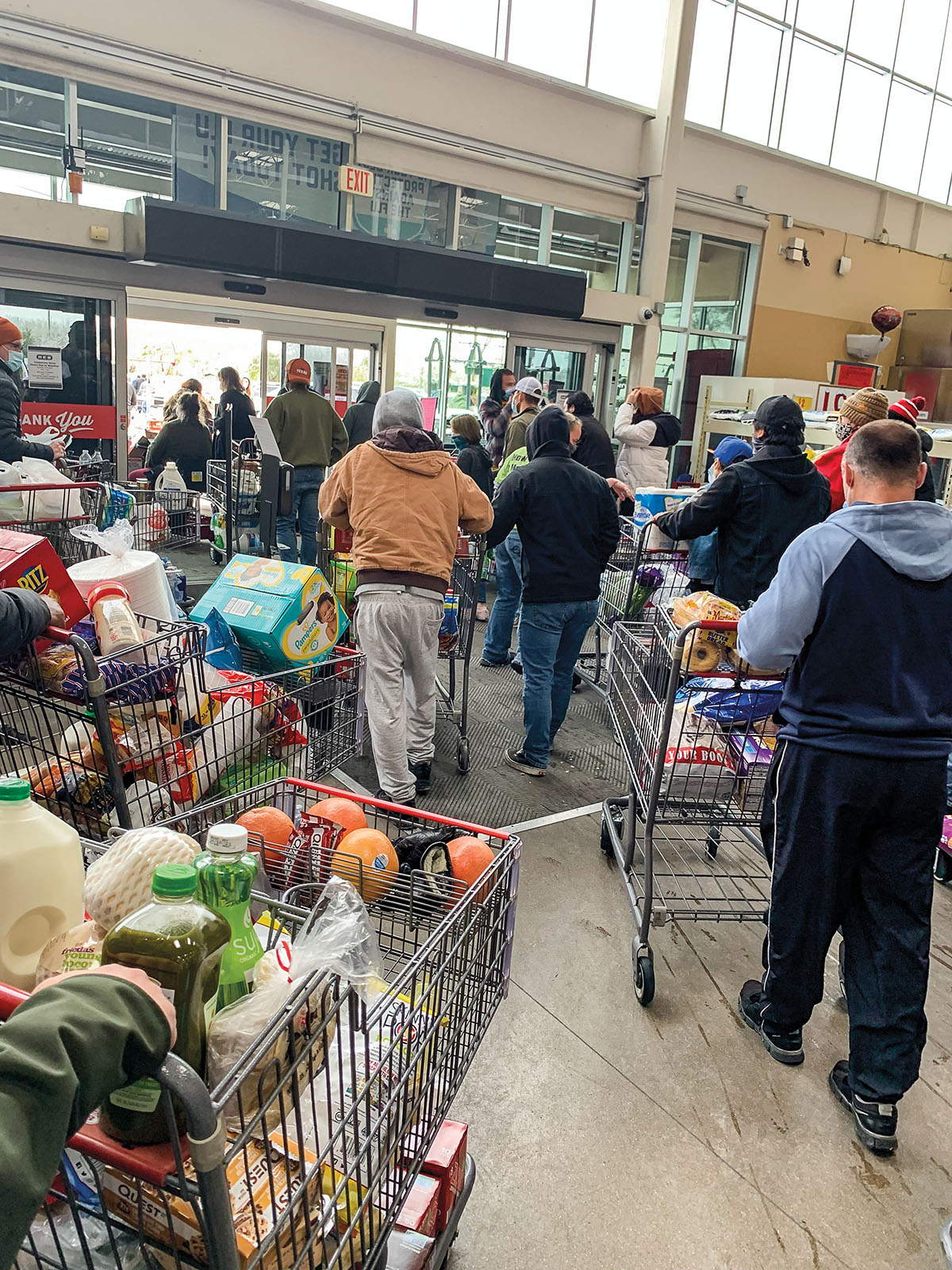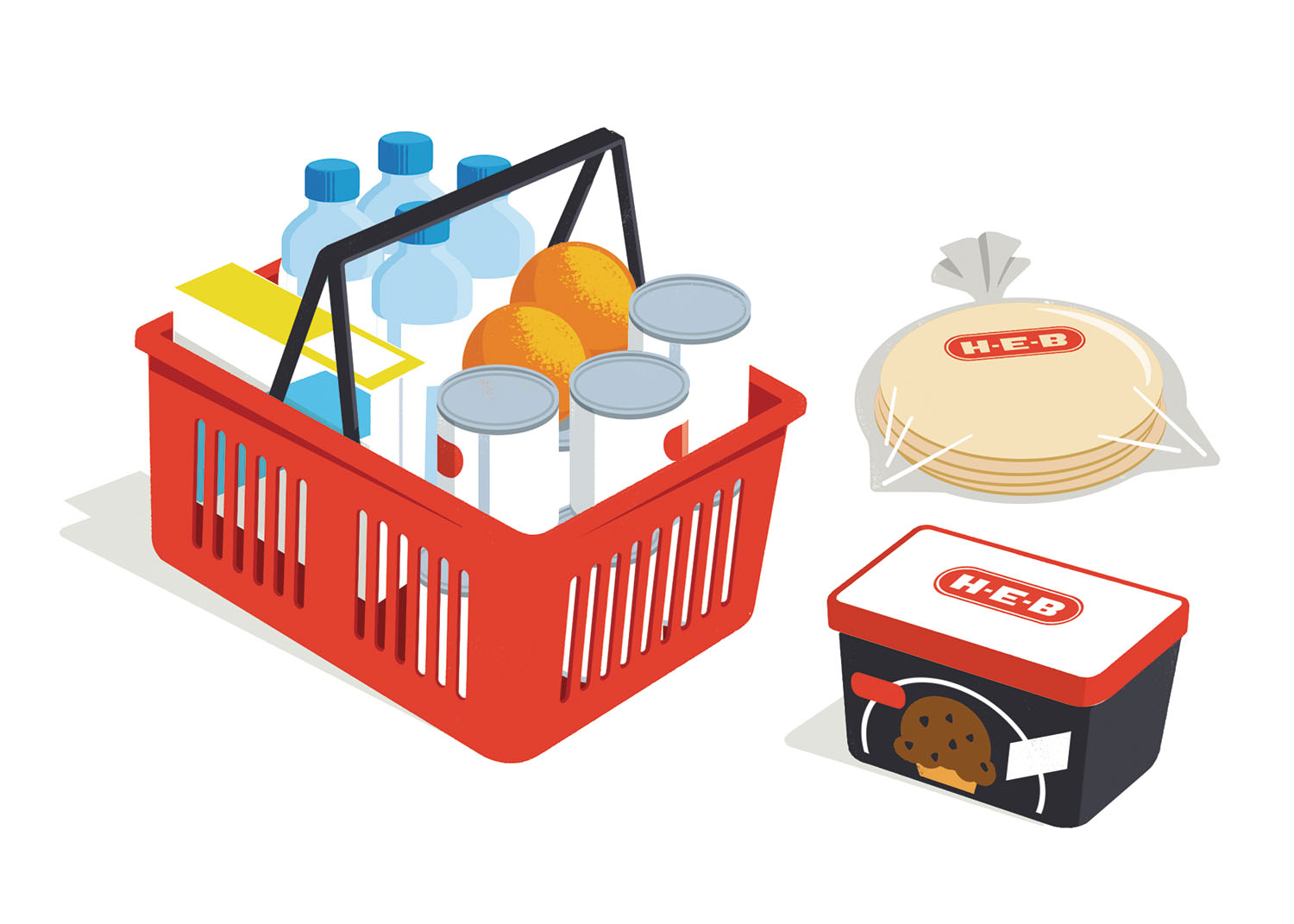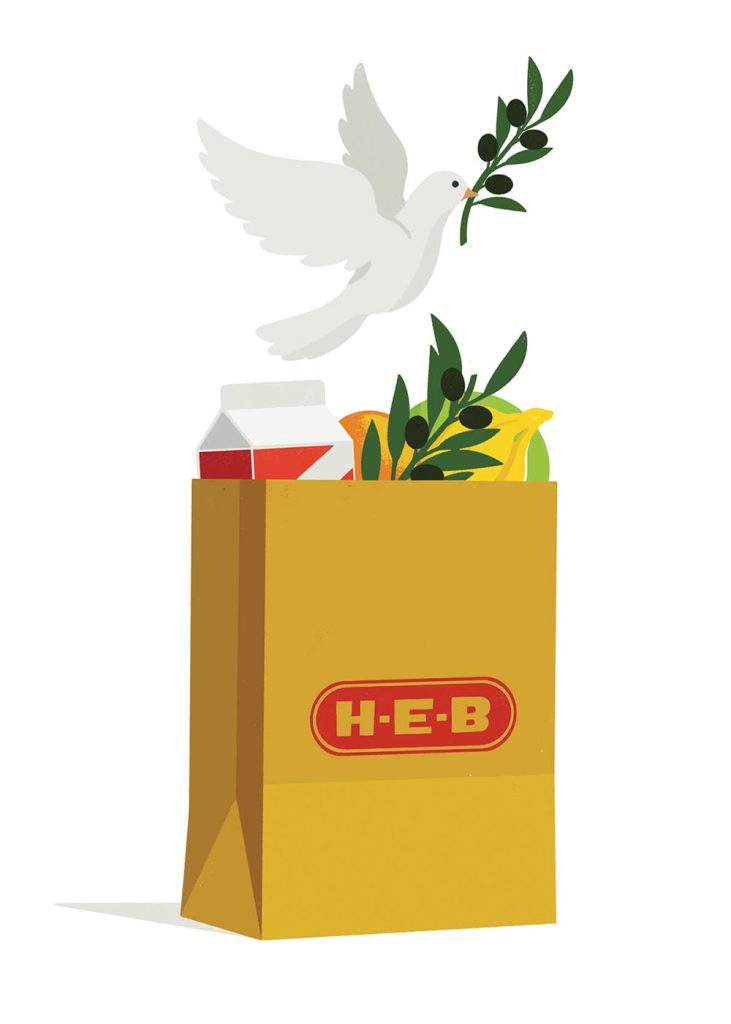21 KiB
| Tag | Date | DocType | Hierarchy | TimeStamp | Link | location | CollapseMetaTable | |||
|---|---|---|---|---|---|---|---|---|---|---|
|
2024-11-13 | WebClipping | 2024-11-13 | https://texashighways.com/culture/how-heb-became-texas-most-beloved-brand/ | true |
Parent:: @News Read:: 🟥
name Save
type command
action Save current file
id Save
^button-HowH-E-BBecameTexasMostBelovedBrandNSave
How H-E-B Became Texas' Most Beloved Brand
H-E-B’s quiet acts of kindness are preserving communities and cementing the grocery giant as Texas’ most beloved brand
By Michael J. Mooney
Illustrations by Chris Gash
When the lights went out at his neighborhood grocery store, Tim Hennessy knew he didn’t have much time. He told his wife, Deb, they should split up to cover more ground before the customers were inevitably asked to leave the premises.
This was the fifth day of the catastrophic freeze that pummeled almost every part of Texas in February 2021. As the state’s energy grid failed to keep up with demand, millions of homes and businesses lost power. Hundreds of people died, and property damage estimates reached the hundreds of billions. The power at the Hennessy house in Leander, just north of Austin, had flickered on and off since the first storm hit on Feb. 13, and—like so many other residents across the state—the family had gone several days without running water.
They’d stocked up on groceries before the roads iced, but Tim, a 63-year-old IT worker, noticed some fresh snow had fallen and figured driving might be slightly less treacherous in the first few hours of the storm. Not knowing when they’d get another opportunity, they had decided to make a quick run to the local H-E-B.
Because of the congestion inside, and a subsequent shortage of carts, the Hennessys couldn’t even enter the store for 20 minutes. Then, just as they’d started piling fruit, eggs, milk, and protein bars into their basket, they heard the jarring ZERRRP sound of the power shutting off. Sure enough, it didn’t take long for a store employee to come by and ask them to head toward the registers.
Even with 20 cashiers on hand, a battalion of carts curled down every aisle. Hundreds of shoppers, clad in layered sweatshirts and puffy winter coats, were all wondering: If the power is out, how are they ringing anyone up?
Tim couldn’t see through the crowd, but he thought there might be employees at the front of each line resorting to pencil and paper. He doesn’t usually do the grocery shopping in the family, so he turned to Deb and joked, “The one time I come shopping, this is what I get!”
A few minutes later, the line started moving. Tim, still thinking there might be employees typing into battery-powered calculators, noticed that the lines were shrinking quickly.
“Wow,” he told Deb. “These guys are fast!”
When it was their turn at the register, the Hennessys started loading their groceries on the conveyor belt but were told to put the groceries back in the cart. The woman at the register asked if they had alcohol. They didn’t. Then she waved them toward the exits.
“Go home and be safe,” she said.
As the Hennessys looked around at the hundreds of customers—all carrying untold sums of diapers, milk, cans, and jars—it dawned on them what was happening. Deb immediately started tearing up. And when Deb gets emotional, Tim gets emotional.
“It’s not like we needed it,” Tim tells me. “But just the gesture, to let people leave like that—it was very touching.”
Tim HennessyTim Hennessy’s photo from H-E-B in Leander during the 2021 winter freeze went viral online.
The store exit, Tim remembers, suddenly felt like the end of a wedding, with eight or so H-E-B employees forming a tunnel by the door, smiling, waving, and wishing everyone a safe journey. Between the dropping temperatures and the power loss and the hundreds of confused, hungry strangers, the situation could have been bedlam. But the mood heading out to the frozen parking lot was, Tim recalls, “festive.”
H-E-B verified the story on Twitter, but otherwise the company didn’t mention what happened that afternoon in Leander. No press release. No social media videos promoting the store’s incredible generosity or commitment to its community.
Nothing.
It turns out, that’s typical. The San Antonio-based grocery chain has a zealous fandom built on the foundation of products like warm store-made tortillas, Creamy Creations ice cream, and a poblano-green tomato salsa simply called That Green Sauce. Food & Wine magazine annointed H-E-B America’s best supermarket in 2023, and, that same year, the grocery chain topped a list of 64 iconic Texas brands in a March Madness-style bracket run by Texas Monthly. It’s no wonder then that the store’s motto, repeated in commercials across the state, is: “Here Everything’s Better.” Yet there’s something else that makes the chain popular. Something more than the quality of its produce or private-label offerings.
The humanity the Hennessys and hundreds of other customers witnessed in Leander is hardly an isolated incident. In fact, it doesn’t take much effort to drum up dozens of examples of H-E-B’s remarkable benevolence all over the state. These include grand gestures that have attracted international attention as well as smaller, quieter acts of kindness that have turned casual shoppers into lifelong H-E-B evangelists.
But the company doesn’t spend a lot of time publicizing these good deeds. In an era rife with shameless self-promotion, the grocery giant’s motivation, it seems, is more complex.
I reached out to their headquarters in San Antonio to inquire about their moment of largesse in Leander, as well as several other examples of unpublicized altruism. H-E-B has more than 400 stores and 154,000 employees. In an Amazon addicted society reliant upon online commerce—where public interfacing has all but vanished—it’s rare to see a chain of this size care so much about its customers. And it’s rarer still to see a for-profit company that doesn’t want to spin its generosity into some marketing opportunity. So, I went to the them with a simple question: What is it about the culture at H-E-B that sets it apart?
After a few weeks, I was told that the company had discussed the matter internally and decided not to comment for this story.
Of course.
Blues on the Green had gotten too big. The massive, free concert series, hosted by Austin City Limits Radio, had never been a lucrative venture. Some years it didn’t even break even. But it’s a beloved summer tradition, and maybe the most Austin gathering in Austin. Not long after the series started 35 years ago at the Arboretum, it moved to Zilker Park, the gem of the city’s park system. It has since featured local acts including Shakey Graves, Jamestown Revival, Jimmie Vaughan, and Gary Clark Jr. For decades, families have come out with picnic blankets and coolers and basked beneath the glorious Hill Country night skies while listening to local music of all genres. There are no tickets, no gates—just good vibes, great music, and lasting memories.
As the annual crowds grew, though, the logistics of the concerts got more expensive. Bigger staging, more signage, additional police officers hired for security. Without admission fees or beverage sales, putting on the shows became a bigger and more daunting challenge. Traditionally, most of the sponsors and vendors were local mom and pop companies selling ice cream and kombucha—not the national beer and automobile brands typically attached to bigger live music ventures. Unwilling to upend that dynamic, organizers announced in 2024 they wouldn’t be renewing Blues on the Green after more than three decades.
Longtime fans of the series were heartbroken. Following in the wake of closures like Dart Bowl and Threadgill’s in 2020, local newscasts were filled with Austinites lamenting the loss of yet another iconic institution. Plenty even dreaded what a resurrected version of the series might entail: Expensive tickets? Drunken debauchery resulting from the introduction of alcohol sales? Or even worse, some soulless out-of-state corporate sponsorship?
That’s when the organizers got a call from H-E-B.
“They were interested immediately in helping save Blues on the Green,” says Andy Langer, a longtime ACL Radio host and Blues on the Green concert booker. “They came to the table and said, ‘What can we do?’”
The grocery giant not only wanted to save the concert series for a year—it sought to find a way to sustain Blues on the Green in perpetuity. According to Langer, H-E-B initiated conversations with city leaders in Austin, convincing officials to waive certain costs including some permits and security. At no point during the negotiations did the company insist on any self-aggrandizing contingencies.
“They didn’t come in and say, ‘We need the whole stage backdrop to say H-E-B,’” Langer says. “They didn’t make it about them.”
This is the sort of selfless magnanimity I found over and over. And not just with free concerts or groceries.
Courtesy of Blues on the GreenThe summer Blues on the Green concert series in Austin was in danger of ending until H-E-B stepped in to save it in 2024.
As Hurricane Harvey made landfall in Texas in August 2017, causing massive flooding, power loss, and at least 100 deaths—H-E-B was there to help staunch the damage. Not only did the company fight to keep nearly every store open in areas affected by the storm, H-E-B flew in truckers from other parts of the state and dispatched a convoy of water tankers, mobile pharmacies, kitchens, and business centers. Anyone in the afflicted communities—from Houston to Kingsville—could use the internet to contact relatives; get free, clean water; and have a hot meal served by H-E-B employees.
We do everything we can to not only recover our stores but also recover our communities,” Justen Noakes, H-E-B’s director of emergency preparedness, told Texas Monthly at the time. “Because that’s where we’re from as well. It’s not only a matter of bringing our stores up as quickly as possible, but the sooner that we can provide relief and the comfort and the items that people need to return themselves to normalcy, the better off the whole community is.”
After the Uvalde tragedy in 2022, when a gunman killed 19 students and two teachers at Robb Elementary School, CEO Charles Butt, the Butt family, and H-E-B collectively donated at least $10 million to build a new school so students and faculty wouldn’t have to return to the traumatic scene.
“Our first store in Uvalde opened in 1959, and Uvalde people are our people,” Butt announced in a rare public statement. “As we continue to mourn tremendous loss, I join with my family and H-E-B in working to ensure the Uvalde community can move forward from this tragic event. Our children are this country’s future, and our schools should be a safe place where children can thrive and envision new possibilities.”
The donation made headlines at the time, but Mickey Gerdes, the board treasurer of the Uvalde CISD Moving Forward Foundation, a nonprofit arm of the school district, says the Butt family has played an important role in the community’s recovery out of the public eye.
“Their support for Uvalde runs deeper than the work to build a new elementary school,” Gerdes says. “They have stood by and with our community, and their continued support demonstrates their true care for Texas and Texans.”
H-E-B was also ahead of the curve in nearly every way during COVID, forming a tactical plan weeks before the country shut down. The company reduced store hours to give employees more time to stock the shelves and imposed purchase limits on essentials like toilet paper to prevent hoarding. Even as most of the American economy froze, H-E-B’s hourly store, warehouse, manufacturing, and transportation employees received $2 per hour raises. Arnold Schwarzenegger was so impressed, he tweeted that the company’s planning was a “masterclass in preparation and being able to support your community.”
There are a litany of other examples of H-E-B’s generosity—from a program that gives discounts to retired store employees to the company’s Kerrville-based H. E. Butt Foundation, which has served Texans in need since 1933. Those initiatives include buying houses for veterans and giving millions to help children’s literacy. And, to be clear, Texas’ cherished grocery brand provides plenty of press releases touting its charitable contributions on its own website.
But once you start digging, it’s apparent how many they don’t post, too.
Think about the role a good grocery store plays in a community. It’s an outgrowth of the old general stores that dotted the American landscape starting in the late 1700s. If you needed something you couldn’t build or grow yourself, the shopkeeper would figure out a way to get it for you at a fair price. A good general store was the fulcrum of a town.
What we think of as the modern grocery store evolved from that over the last century. Instead of catering to individualized orders, store owners tried to stock the necessities—fresh produce, dairy products, and butchered meat all in the same place. Piggly Wiggly famously instituted self-service stores in 1916, allowing customers to gather items themselves. Retail titans like Walmart and Target even got into the game around the turn of the century.
H-E-B’s history follows a similar trajectory, with Florence Butt opening Mrs. C.C. Butt’s Staple and Fancy Grocery on the ground floor of her family’s Kerrville home in 1905. After Florence’s youngest son, Howard Edward Butt, returned from World War I in 1919, he took over, eventually expanding across South Texas and changing the name on the sign to his own initials. By the 1950s, H-E-B locations included bakeries and pharmacies, and within another two decades, the chain was bringing in $250 million annually.
In 1971, Howard’s younger son, Charles Butt, became president of H-E-B, a position he still holds at age 86. Which means that in this company’s nearly 120-year history, it’s remained family-owned and operated. Even as it draws in tens of billions of dollars in business every year—it’s now the fifth-largest private business in the country—the company has somehow been able to maintain some of that
historical fabric.
Those modest roots have led to a company culture that empowers employees to minister to a customer’s individual needs. These encapsulate a vast array of shopping scenarios, from the mundane to miserable. In a YouTube video, one mom divulged the story of what could have been a birthday disaster. When a preordered custom cake included a misspelling of her child’s name, H-E-B immediately compensated her with a replacement cake, as well as a cart full of free groceries.
Langer, the Blues on the Green booker, spoke of another anecdote that had nothing to do with music. During an Austin boil water notice in 2021, his neighborhood store in the Allandale Village Shopping Center was completely cleaned out of bottled water. But a sign posted on the desolate shelves directed customers to a temporary Twitter account that would alert guests when they had received new stock.
“They weren’t putting it out on the main H-E-B account,” Langer told me. “They were looking out for me and my neighbors so that we got the water that was being delivered to our store.”
There are countless examples along these lines, posted by social media accounts from all over the state. It’s obviously out of the ordinary for modern corporate America, but for the cost of a few briskets or a jar of pasta sauce, the company is creating an army of fervent advocates.
That kindness is contagious, too. Tim Hennessy told me that after he left the H-E-B in Leander, people were helping each other load groceries in the icy parking lot. When he got home and told the story to his neighbors, he watched that sense of goodwill spread even further. In the end, he says his family donated twice what they would have spent on groceries that day to the H. E. Butt Foundation.
Friendliness is a Texas ethic. But even other Texas brands known for positive corporate culture—think Southwest Airlines, Tito’s Handmade Vodka, and Buc-ee’s—aren’t building schools or saving beloved local cultural institutions.
So, why H-E-B?
Recently, I went to an H-E-B close to my house in the booming suburbs north of Dallas. For decades, H-E-B served Central and South Texas, but—with the exception of H-E-B-owned Central Market and a few other spinoff stores—the company mostly avoided the Dallas-Fort Worth area. The grocery industry has long been a hyper-regional business, mainly due to warehousing logistics, but also territorial entrenchment. Until recently, DFW was firmly in the dominion of Kroger and Albertson’s.
When I lived in Austin 20 years ago, I was addicted to the store’s flour tortillas, house-baked bolillo rolls, and its unsung banana pudding. So I was looking forward to the company’s northern expansion in Texas. But as I walked around that giant new market edifice, I thought about what makes H-E-B so different. Because it’s certainly more than the brand’s butter tortilla-scented candles, Mi Tienda refried beans, and exemplary private-label potato chips in flavors like Korean BBQ and Mexican street corn.
There’s a certain vibe at H-E-B. For instance, the woman working the register at the on-site barbecue restaurant making easy conversation with a loquacious customer. Or the cashier overseeing the self-check stations handing out H-E-Buddy Bucks to children ecstatic to play the free spin-and-win game.
I also felt a small degree of Tim Hennessy’s kindness contagion walking among the Texas-themed furniture and backyard games in Dallas. I caught myself nodding to strangers, enamored to witness so many people clearly enjoying themselves as they did something as mundane as knocking out their weekly shopping list.
Then I thought about all the people H-E-B has affected over the years. The kids who won’t have to go to school in a building tainted by horror. The families who were able to obtain water and food in the wake of a devastating storm. The neighbors who could procure milk and produce in the middle of a cataclysmic winter freeze.
If you only saw the store’s commercials, you might think H-E-B stands for “Here Everything’s Better,” the company’s marketing tagline introduced in the 1990s. I’d heard this slogan for years and never really thought much about it. But upon reflection, it rang true.
Sure, H-E-B’s glowing reputation likely drives sales far beyond what the company allocates to any good deeds. And the company’s donations and charity work are undoubtedly a savvy tax write-off. But that certainly doesn’t discount the impact H-E-B has had on so many individuals and communities across the state.
Perhaps the real question isn’t: Why does H-E-B do so many nice things for the state? But: Why aren’t more companies like H-E-B?
Tim has wondered the same thing. When he got home he logged on to Facebook and posted a photo Deb took of the crowd with some notes chronicling his experience. The post was shared tens of thousands of times and picked up by national news outlets like CNN and the Washington Post. Within days, he was getting messages and cards from as far away as Austria. Before then, Tim didn’t think much about where his groceries came from. Now, he’s a customer for life.
“Whenever we leave the state,” he says, “we really miss H-E-B.”
$= dv.el('center', 'Source: ' + dv.current().Link + ', ' + dv.current().Date.toLocaleString("fr-FR"))




